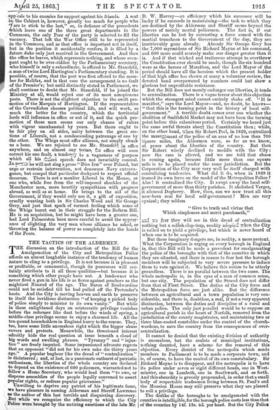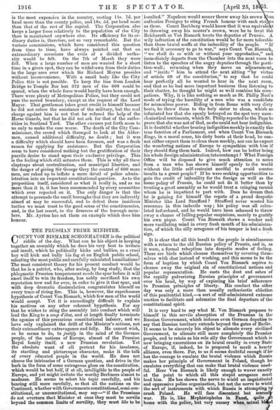THE TACTICS OF THE ALDERMEN.
'THE discussion on the introduction of the Bill for the Amalgamation of the City and Metropolitan Police -affords an almost laughable instance of the tendency of human nature to cling to a privilege. It is not because it is pleasant or profitable, or ornamental, though its possessors will cer- tainly attribute to it all these qualities—but because it is something which other people have not. A landowner who never fired a gun in his life is as fierce against poachers as the mightiest Nimrod of the age. The Baron of Bradwardine -could not be satisfied till he had pulled off the Pretender's boots. And the City is moving heaven and earth to preserve to itself the invidious distinction "of keeping a picked body of police simply to minister to its own vanity." But while in these enlightened days an aristocratic privilege vanishes before the reformer like dust before the winds of spring, a middle-class privilege seems to enjoy a charmed life. All the ten-pound householders in England hurry to the rescue. They, too, have some little anomalous right which the bigger abuse .covers and protects. Meanwhile, the threatened interest .adroitly hide the real question at issue beneath a cloud of big words and swelling phrases. " Tyranny " and " injus- tice " are freely imputed. Some impassioned advocate regrets that an opponent "did not for his own sake die thirty years -ago." A popular bugbear like the dread of "centralization" -is disinterred ; and, at last, in a passionate outburst of patriotic -enthusiasm, the liberties of the whole country are declared to depend on the existence of 600 policemen, warranted not to follow a Home Secretary, who would lead them "to awe, or -disperse assemblies of the people legally convened to assert popular rights, or redress popular grievances." - Unwilling to deprive any patriot of his legitimate fame, -we have pleasure in naming Alderman and Sheriff Lawrence as the author of this last terrible and disquieting discovery. But while we recognize the efficiency to which the City Police were brought by the untiring exertions of the late Mr. D. W. Harvey—an efficiency which his successor will be lucky if he succeeds in maintaining—the task to which they are destined by the Alderman and Sheriff seems beyond the powers of merely mortal policemen. The fact is, if our liberties can be lost by entrusting a force armed with the martial truncheon to the Government of the day, they are irretrievably gone already. Already Sir George Grey has the 7,000 myrmidons of Sir Richard Mayne at his command, and 600 more could scarcely make our danger greater than it is. And if that wicked and traitorous attempt to overthrow the Constitution ever should be made, though the six hundred were as the heroes of Marathon, and the' Lord Mayor of the period should have all the heroism which the present holder of that high office has shown at many a volunteer review, the devoted band overpowered by numbers could but show a glorious but unprofitable resistance.
But the Bill does not merely endanger our liberties, it tends to centralization. There is a vague terror about this objection which the strongest mind cannot entirely shake off. "It is manifest," says the Lord Mayor—and, no doubt, he knows- " that this is the turning point in the history of local self- government." A terrible doubt comes over one whether the abolition of Smithfield Market may not have been the turning point before this calamitous period. Certainly we heard just the same awful threats about the Constitution then ; while on the other hand, when Sir Robert Peel, in 1829, centralized the mane.pment of the police of an area of no less than 700 Square miles, the Aldermen were, so far as we know, at peace about the liberties of the country. But then Sir Robert wisely declined to meddle with the City : now the case is altered, and we are told that chaos is coming again, because little more than one square mile is to be placed under the same jurisdiction. But the Corporation of the City may very well be itself charged with centralizing tendencies. What did it do, when in 1839 it framed its own force on the model of the Metropolitan Police ? Alas ! it centralized the City. It swept away the local self- government of more than thirty parishes. It abolished Verges, it silenced Dogberry. How, then, can we now trust all this new-born zeal for local self-government ? Men are very cynical; they seldom "Give to truth and virtue that Which simpleness and merit purchaseth," a,r,e, fpar they will see in this dread of centralization nothing but a selfish clap-trap, readily aciopd Ilthen the City is called on to yield a privilege, but which is never heard of when one is to be acquired.
But these imaginary dangers are, in reality, a mere pretext. What the Corporation is urging on every borough in England is, that this Bill will be made a precedent for amalgamating the police of the boroughs with that of the counties in which they are situated, and there is reason to fear lest the borough members will be subjected to very severe pressure to induce them to vote against it. We believe this notion to be utterly groundless. There is no parallel between the two cases. The whole metropolis is, in the eyes of a man of common sense, but one city. The population of the Strand does not differ from that of Fleet Street. The duties of the City force and the Metropolitan force are just alike. But the difference between an agricultural and a town population is very con- siderable, and there is, doubtless, a real, if not a very apparent distinction, between the duties and discipline of a rural and urban police. The only just parallel would be to suppose an agricultural parish in the heart of Norfolk, removed from the jurisdiction of the county magistrates and maintaining two or three blue-coated constables under the control of the church- wardens, to save the country from the consequences of over- centralization.
It cannot be denied that the existing division of authority is anomalous, but the zealots of municipal institutions, nothing daunted, have a scheme for the removal of this objection. Every district of the metropolis which sends members to Parliament is to be made a corporate town, and is, of course, to have the control of its own constabulary. Sir Richard Mayne is to disappear, and the metropolis is to have its police under seven or eight different heads, one in West- minster, one in Lambeth, one in Southwark, and so forth. And this absurdity is gravely propounded, in order that a small body of respectable tradesmen living between St. Paul's and the Mansion House may still preserve what they are pleased to call a privilege. The dislike of the boroughs to be amalgamated with the counties is intelligible, for the borough police costs less thanthat of the ceunties by 14/. 12s. 6d. per head. But the City Police is the most expensive in the country, costing 1 is. 7d. per head more than the county police, and 18s. 5d. per head more than that of the rest of the capital. The Corporation also keeps a larger force relatively to the population of the City than is maintained anywhere else. Its efficiency for its or- dinary duties is, therefore, not so very remarkable. But the various commissions, which have considered this question from time to time, have always pointed out that on extraordinary occasions the evils of a divided autho- rity would be felt. On the 7th of March they were felt. When a large number of men are wanted for a short time in a given spot, they can be withdrawn from their duties in the large area over which Sir Richard Mayne presides without inconvenience. With a small body like the City Police this is not possible. To keep the line from London Bridge to Temple Bar but 372 men of the 608 could be spared, when the whole force would hardly have been enough. There were plenty of Metropolitan Police, but they could not pass the sacred boundary, except at the request of the Lord Mayor. That gentleman takes great credit to himself because he did not refuse the assistance of the military, but the real charge against him is not that he refused the help of the Horse Guards, but that he did not ask for that of the autho- rities in Scotland Yard. The other excuses put forth seem to us only to make the case worse. The death of the City Com- missioner, the crowd which thronged to look at the Alder- men caused additional difficulty, no doubt ; but it was a difficulty which should have been foreseen, and was a fresh reason for applying for assistance. But the Corporation seem to have considered nothing but the gratification of their puerile desire to stand upon their exclusive privilege. This is the feeling which still actuates them. This is why all these daptraps about centralization, and municipal liberties, and the danger of giving Sir George Grey the control of 600 more men, are raked up to inflate a mere detail of police admin- istration into an important constitutional question. As to the proposition itself, considered as what it really is, and as no more than it is, it has been recommended by every committee which ever reported on it. The only danger is that the attempt to persuade the small boroughs that they are indirectly aimed at may be successful, and to defeat these insidious tactics we must trust to the good sense of the constituencies, and, in the last resort, to the firmness of the borough mem- bers. Mr. Ayrton has set them an example which does him honour.































 Previous page
Previous page